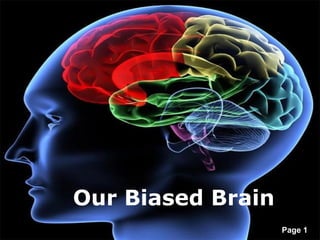Our biased brain
- 1. Our Biased Brain Free Powerpoint Templates Page 1
- 2. General : Brain is the most imporant organ of the body, according to brain :) Human brain capable of 1016 processes/sec 10% brain usage myth. Status of robots.
- 3. Cognitive biases : Genuine deficiency or limitation in our thinking Cognitive biases help us process information more efficiently, especially in dangerous situations.
- 4. Confirmation Bias : We love to agree with people who agree with us. We're put off by sources which make us feel uncomfortable or insecure about our views
- 5. Ingroup Bias : Creates bonding in ingroup Makes us suspicious and fearful for outside group. ? Overestimate the abilities and value of our immediate group at the expense of people we don't really know.
- 6. Gambler's Fallacy : Belief that previous events somehow influence future outcomes. Coin-tossing example Positive expectation bias : luck has to eventually change and that good fortune is on the way.
- 7. Post-Purchase Rationalization : Subconsciously justifying our purchases ˇŞ especially expensive ones Principle of commitment, our psychological desire to stay consistent and avoid a state of cognitive dissonance.
- 8. Neglecting Probability : Getting in car VS in aeroplane Terrorist attack VS falling down from stairs Lottery ticket probability Leads us to overstate the risks of relatively harmless activities, while forcing us to overrate more dangerous ones.
- 9. Observational Selection Bias : Suddenly noticing things we didn't notice before ˇŞ but we wrongly assume that the frequency has increased. After buying new car, we notice same car more often Feeling that the appearance of certain things or events couldn't possibly be a coincidence (even though it is).
- 10. Status-Quo Bias : If it ain't broke, don't fix it We like to stick to our routines, political parties, and our favorite meals at restaurants. Assumption that another choice will be inferior or make things worse
- 11. Negativity Bias : People tend to pay more attention to bad news. ISRO Mars mission Vs any routine news
- 12. Bandwagon Effect : We love to go with the flow of the crowd. "groupthink" or hivemind mentality Why opinion polls are often maligned Our built-in desire to fit in and conform
- 13. Projection Bias : We tend to assume that most people think just like us ˇŞ though there may be no justification for it. Even we think people also agree with us.
- 14. The Current Moment Bias : Difficult to imagine ourselves in future and alter behavior and expectation accordingly. Experience pleasure in the current moment, while leaving the pain for later.
- 15. Anchoring Effect : Tendency to compare and contrast only a limited set of items ? Items on sale in store and restaurant menus
- 16. Conclusion : We humans are not good at taking rational decisions, we're good at rationalizing decisions. Awareness
- 17. Further Reading : Full List of cognitive biases : http://en.wikipedia.org/wiki/List_of_biases_in_judgment_ Reference : http://io9.com/5974468/the-most-commoncognitive-biases-that-prevent-you-from-beingrational
- 18. Created By: Ruchir Brahmbhatt Director, Ecosmob Technologies Pvt. Ltd.
- 20. Thank you



















